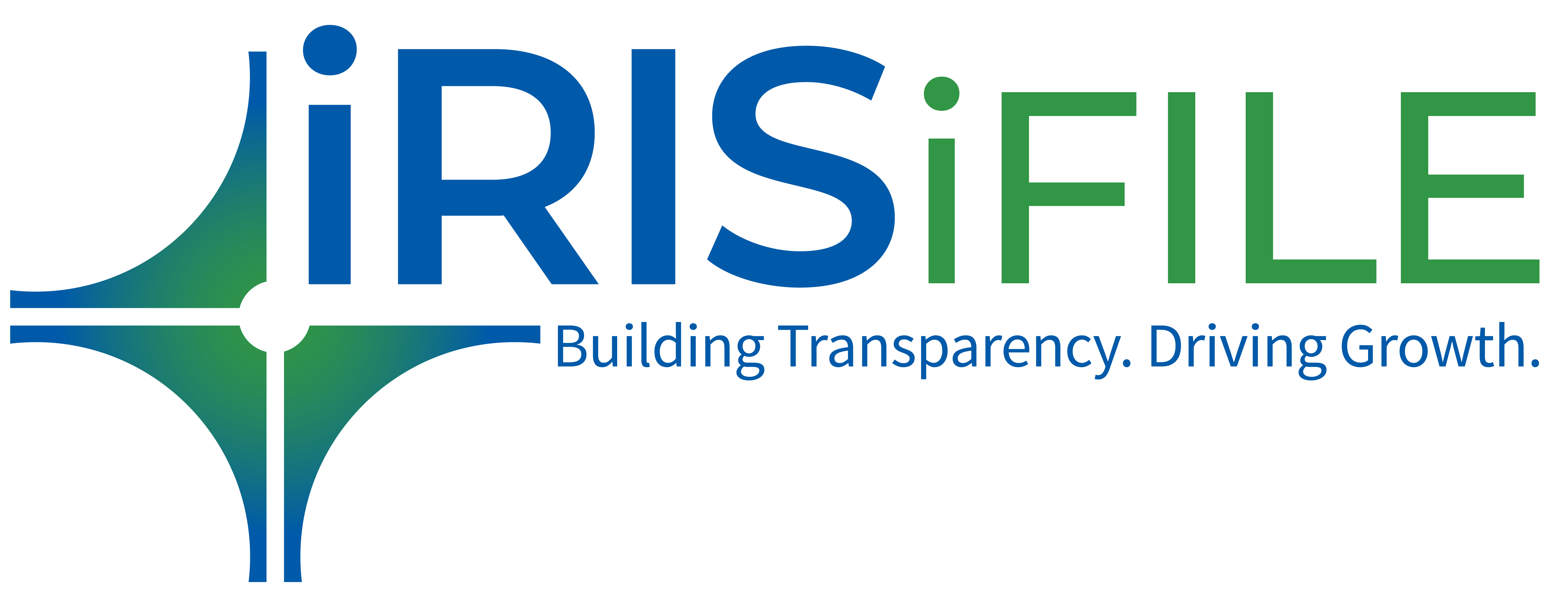Companies Intellectual Property Commission (CIPC), South Africa

The Companies and Intellectual Property Commission (CIPC) is an agency of the Department of Trade and Industry in South Africa. The CIPC was established by the Companies Act, 2008 as a juristic person to function as an organ of state within the public administration, but as an institution outside the public service.
Towards enhancing the filing efficiency of Annual Financial Statements and improving the quality of information submitted, CIPC adopted iXBRL as the underlying information standard in the AFS. It commissioned IRIS to install its iFile framework for collection of AFS from qualifying entities. The mandate for companies to submit data in iXBRL to CIPC started in July 2018.
Background
The CIPC Companies and Intellectual Property Commission of South Africa (CIPC), used to receive all Annual Financial Statements (AFS’s) in PDF format, which is an unstructured format. This meant that the analysis of AFS documents had to be done one-by-one by a human analyst. Humans have to do all calculations manually and are prone to making mistakes or missing important facts within the statements. The analysis scope of PDF documents is therefore very limited.
The CIPC has around 1.8 million registered active entities. A subset of these entities (around 100,000 entities) are required to submit AFS’s. These include all public listed entities, state-owned companies, private companies with a 350 Public Interest Score, and companies whose Memorandum of Incorporation prescribes filing of audited financial statements. The operational efficiency and regulatory effectiveness of the CIPC were very limited due to the unstructured format that AFS were submitted.
The use of XBRL brought a new dimension of efficiency and effectiveness to the CIPC, because of the ability to use XBRL for validation of AFS data against the IFRS taxonomy. A validation engine can run automatically through the rules built into the taxonomy and programmatically verifies that each rule has been adhered to in the AFS’s.
Objectives of Program
- To reduce the administrative burden on businesses when they report financial information to the government for regulatory compliance. Achieving this goal requires reducing duplication and inconsistency in business information reported to various government agencies.
- To provide businesses and investors with valid financial information for better decision making.
- To make it easier for reporting entities to submit data through an online portal rather than email of physical copies.
- XBRL has the potential to cut hours of waste and inefficiency for the entities that prepare their data well. With valid data being submitted the first time itself, it reduces iterations, reduces the risk of errors and hence penalties and enhances the reputation of companies
- The promotion of XBRL in South Africa is driven by XBRL South Africa (which is under the auspices of SAICA), a non- profit organisation. CIPC’s primary objective is to promote and create awareness of the use of XBRL in the country using the taxonomies for South African specific reporting requirements, such as the additional reporting requirements of the SA Companies Act over and above IFRS standards.
- The tagging will allow consumers of information to immediately pull out the exact information they want, and instantly compare it to the results of other companies. The enhanced usability of data offers great advantages to listed companies, analysts, investors as well as for financial journalists who have to report on company performance. It also allows CIPC to monetize the data.
The Solution
Taxonomy
CIPC started by using the IFRS 2016 as base for the taxonomy built for IFRS-FULL and IFRS-SME reporting. The elements that are specifically required for CIPC reporting requirements have been added to the base IFRS taxonomy structure, including the disclosure for Financial Accountability Supplement (FAS). The taxonomy contains 16 entry points for IFRS-FULL, 16 entry points for IFRS-SME, and 2 entry points for GRAP financial reports, 34 entry points in total. The entry points are designed to cover the reporting scenarios taking into account the methods of presentation used and reports specific to the categories of the filers.
The submission format is the iXBRL document, which should conform to inline XBRL v1.1 specifications. As part iXBRL document, the information that is not covered in the source document, but needs to be submitted, can be captured as hidden elements.
CIPC started with the minimal required data elements for the filers. The taxonomy later has been updated for IFRS 2018, 2019 and IFRS 2020 taxonomy.
Client-side software
Every reporting entity is required to have XBRL-capable software in place for compiling AFS data in XBRL format, according to the CIPC’s published taxonomy.
To assist reporting entities in their efforts to obtain client-side software, the CIPC had established a software service provider (SSP) panel. A number of SSPs had been assessed in terms of the software solutions and services they could provide to reporting entities to ensure minimum compliance to the CIPC’s technical XBRL requirements.
A list of recommended SSPs had been published on the CIPC’s website. Reporting entities are encouraged to engage with the recommended SSPs for information on the various solutions, services and license/costing options offered by them.
CIPC also provided a validation service which any SSP can use to validate the iXBRL file even before the actual submission to the filing platform.
Filing Platform
CIPC was looking for a web based solution for accepting the iXBRL based filings with supported documents. However, CIPC was already serving its users with the eservices portal for filing Annual returns and many other requests.
IRIS iFile platform was integrated with the e-services portal so that it gives one “User Interface” feeling for the users. Single sign-on was established for all the users which made it very easy for users to use only one portal. The submission of iXBRL file for AFS (Annual Financial Statements) was made available on the iFile platform which gets validated instantaneously to show if there are any errors with the submission along with email notification.
This process has significantly reduced the manpower required by CIPC to check the filings. From doing random sampling checks, CIPC can now validate every filing.
CIPC also made it mandatory to submit AFS in iXBRL format for the eligible entities to complete Annual return.
Regulatory usage
With the new filing platform, CIPC now gets validated filings as per the set criteria. Each filing is checked for fulfillment of all national accounting rules as well as over 600 custom rules. CIPC is able to review financials of all companies from the platform itself. All review comments, sharing of information, review workflow is part of the platform. The CIPC can view historical reports for any entity.
Analytical System
On top of the filing platform, the analytical platform was built for internal consumption of CIPC. The analytical system allows CIPC to run risk models, compare different companies, see industry level data or simply aggregate data through a grouping and filter mechanism.
Taxonomy editor
Taxonomy is the master list of all data that CIPC collects from the regulated entities. It contains all the validation logic. For managing this master list, CIPC uses our taxonomy editor NOAH.
Technology stack
e-Filing platform- Microsoft stack, Angular Js
XBRL Validator – Java on Redhat Linux
Analytics system – Microsoft SSRS
The Results
Pilot testing and roll-out
The CIPC selected and notified around 100 top JSE-listed companies to be part of a pilot test phase starting in February 2018. The purpose of pilot testing was to test functionality of both the CIPC’s portal for uploading of AFSs via XBRL and the client-side software used by the companies for producing AFSs in iXBRL format.
Pilot companies could use any valid set of statements of any previous year, because submissions during the pilot phase was only used for testing, and were discarded from the CIPC system before live roll-out of XBRL.
The pilot phase concluded successfully with CIPC receiving 114 successful filings through the e-filing platform. In total 60 listed companies participated in the pilot. The pilot rollout helped CIPC to manage some minor technical issues, taxonomy updates. These were then updated and published by CIPC. This made CIPC and entities ready for the big launch on 1st July 2018.
“We are satisfied with the results and believe the system offers users long-term benefits, especially if they integrate it with their back-end systems,” stated CIPC commissioner Rory Voller.
Live Roll out
South Africa is one of the first countries in Africa to introduce this Financial and Regulatory reporting technology. The Filing of financial statements to the CIPC in XBRL format with the Annual Returns became mandatory from the 1 July 2018 for companies meeting the Audit threshold.

CIPC iXBRL programme was one of the successful XBRL implementations. The iXBRL platform is live now and more than 35000 filings have been submitted successfully on the platform.
“This system has the capacity to ensure that there is integrity in the financial reporting mechanism to different agencies in government. Furthermore, it supports greater transparency, improves the efficiency of capital markets by assisting analysts, financial and security regulators, business registrars, tax authorities and other users to access relevant facts,” said Minister Rob Davies.
About CIPC
When the 2008 Companies Act came into effect on 1 May 2011, the CIPC was created from the merger of Companies and Intellectual Property Registration Office (CIPRO) and the Office of Company and Intellectual Property Enforcement (OCIPE).
Functions of the Commission
- Registration of Companies, Co-operatives and Intellectual Property Rights (trade marks, patents, designs and copyright) and maintenance thereof
- Disclosure of Information on its business registers
- Promotion of education and awareness of Company and Intellectual Property Law
- Promotion of compliance with relevant legislation
- Efficient and effective enforcement of relevant legislation
- Monitoring compliance with and contraventions of financial reporting standards, and making recommendations thereto to Financial Reporting Standards Council (FRSC)
- Licensing of Business rescue practitioners
- Report, research and advise Minister on matters of national policy relating to company and intellectual property law
About IRIS
IRIS Business Services Limited is a leading structured data solutions company with a global presence in regulatory and compliance reporting software. The firm is uniquely positioned with offerings across the spectrum of creation, management, and use of structured data in the realm of business and financial reporting. IRIS serves a client base that includes regulators in over a dozen countries around the world, leading banks, financial market intermediaries, consulting firms, financial printers as well as large and small enterprises. Our partner network includes the Big 4 accounting firms, system integrators, and specialized software and consulting firms that use IRIS’s products and expertise to enhance their offerings to end clients.








